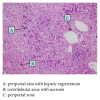Liver Transplant in a Patient under Methylphenidate Therapy: A Case Report and Review of the Literature
- PMID: 25688317
- PMCID: PMC4320912
- DOI: 10.1155/2015/437298
Liver Transplant in a Patient under Methylphenidate Therapy: A Case Report and Review of the Literature
Abstract
Background. Methylphenidate (MPH) is widely used in treating children with attention-deficit-hyperactivity disorder. Hepatotoxicity is a rare phenomenon; only few cases are described with no liver failure. Case. We report on the case of a 12-year-old boy who received MPH for attention-deficit-hyperactivity disorder. Two months later the patient presented with signs and symptoms of hepatitis and MPH was discontinued, showing progressive worsening and developing liver failure and a liver transplantation was required. Other causes of liver failure were ruled out and the liver biopsy was suggestive of drug toxicity. Discussion. One rare adverse reaction of MPH is hepatotoxicity. The review of the literature shows few cases of liver injury attributed to MPH; all of them recovered after withdrawing the treatment. The probable mechanism of liver injury was MPH direct toxicity to hepatocytes. In order to establish the diagnosis of MPH-induced liver injury, we used CIOMS/RUCAM scale that led to an assessment of "possible" relationship. This report provides the first published case of acute MPH-induced liver failure with successful hepatic transplantation. Conclusions. It is important to know that hepatotoxicity can occur in patients with MPH treatment and monitoring the liver's function is highly recommended.
Similar articles
-
[Does methylphenidate cause liver damage? An analysis of ad hoc reports to the "Bundesinstitut für Arzneimittel und Medizinprodukte (BfArM)"].Z Kinder Jugendpsychiatr Psychother. 2018 Jul;46(4):342-348. doi: 10.1024/1422-4917/a000565. Epub 2017 Dec 14. Z Kinder Jugendpsychiatr Psychother. 2018. PMID: 29237323 German.
-
Pharmacokinetics and therapeutic effect of OROS methylphenidate under different breakfast conditions in children with attention-deficit/hyperactivity disorder.J Child Adolesc Psychopharmacol. 2011 Jun;21(3):255-63. doi: 10.1089/cap.2010.0083. J Child Adolesc Psychopharmacol. 2011. PMID: 21663428 Clinical Trial.
-
A comparison of once-daily extended-release methylphenidate formulations in children with attention-deficit/hyperactivity disorder in the laboratory school (the Comacs Study).Pediatrics. 2004 Mar;113(3 Pt 1):e206-16. doi: 10.1542/peds.113.3.e206. Pediatrics. 2004. PMID: 14993578 Clinical Trial.
-
Pemoline-associated fulminant liver failure: testing the evidence for causation.Clin Pharmacol Ther. 1995 Jun;57(6):696-8. doi: 10.1016/0009-9236(95)90233-3. Clin Pharmacol Ther. 1995. PMID: 7781270 Review.
-
Drug Regimen Individualization for Attention-Deficit/Hyperactivity Disorder: Guidance for Methylphenidate and Dexmethylphenidate Formulations.Pharmacotherapy. 2019 Jun;39(6):677-688. doi: 10.1002/phar.2190. Epub 2018 Nov 23. Pharmacotherapy. 2019. PMID: 30351459 Review.
Cited by
-
Worldwide Use of RUCAM for Causality Assessment in 81,856 Idiosyncratic DILI and 14,029 HILI Cases Published 1993-Mid 2020: A Comprehensive Analysis.Medicines (Basel). 2020 Sep 29;7(10):62. doi: 10.3390/medicines7100062. Medicines (Basel). 2020. PMID: 33003400 Free PMC article. Review.
-
From Clinical Application to Cognitive Enhancement: The Example of Methylphenidate.Curr Neuropharmacol. 2016;14(1):17-27. doi: 10.2174/1570159x13666150407225902. Curr Neuropharmacol. 2016. PMID: 26813119 Free PMC article. Review.
-
Influence of Ageing on the Pharmacodynamics and Pharmacokinetics of Chronically Administered Medicines in Geriatric Patients: A Review.Clin Pharmacokinet. 2025 Mar;64(3):335-367. doi: 10.1007/s40262-024-01466-0. Epub 2025 Jan 11. Clin Pharmacokinet. 2025. PMID: 39798015 Free PMC article. Review.
References
-
- Greenhill L. L. Stimulant medication treatment of children with attention deficit hyperactivity disorder. In: Jensen P. S., Cooper J. R., editors. Attention Deficit Hyperactivity Disorder: State of Science. Best Practices. Kingston, NJ, USA: Civic Research Institute; 2002. pp. 9–27.
-
- Arcieri R., Germinario E. A. P., Bonati M., et al. Cardiovascular measures in children and adolescents with attention-deficit/hyperactivity disorder who are new users of methylphenidate and atomoxetine. Journal of Child and Adolescent Psychopharmacology. 2012;22(6):423–431. doi: 10.1089/cap.2012.0014. - DOI - PubMed
LinkOut - more resources
Full Text Sources
Other Literature Sources


